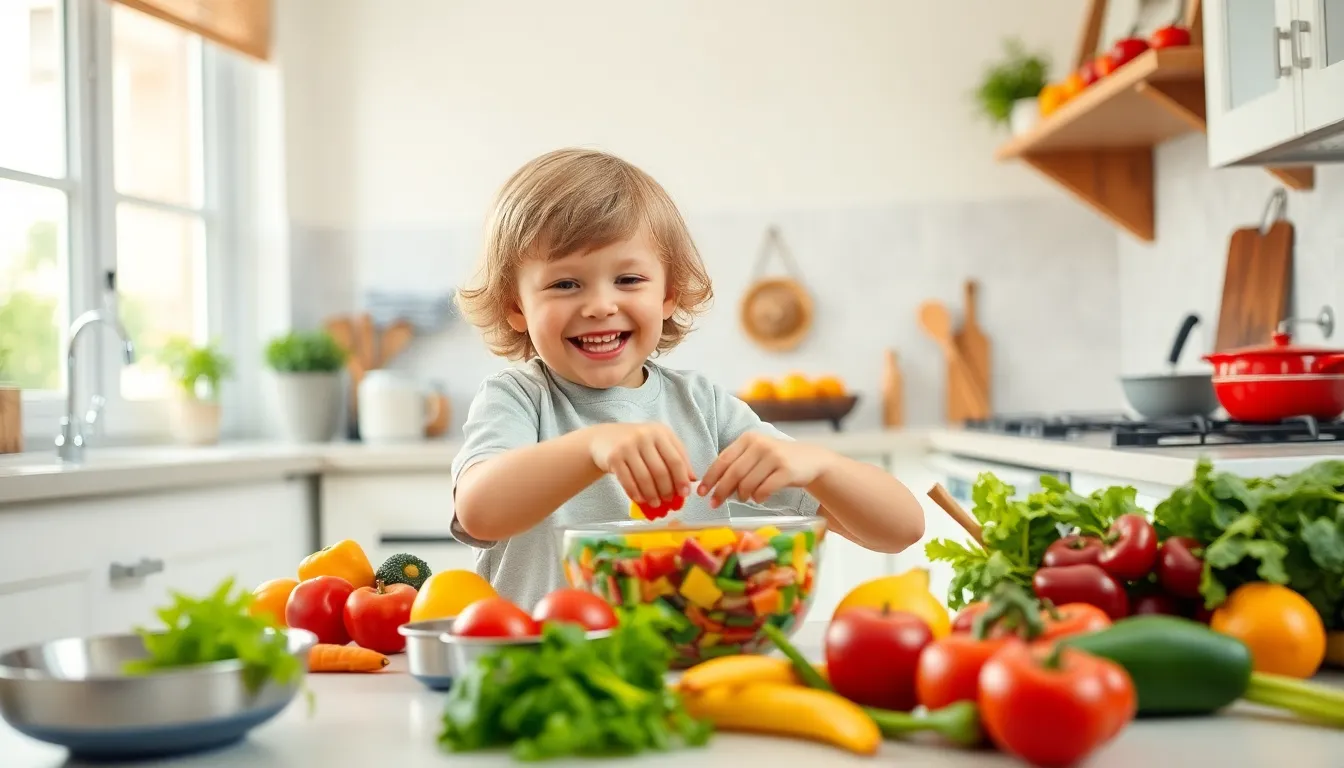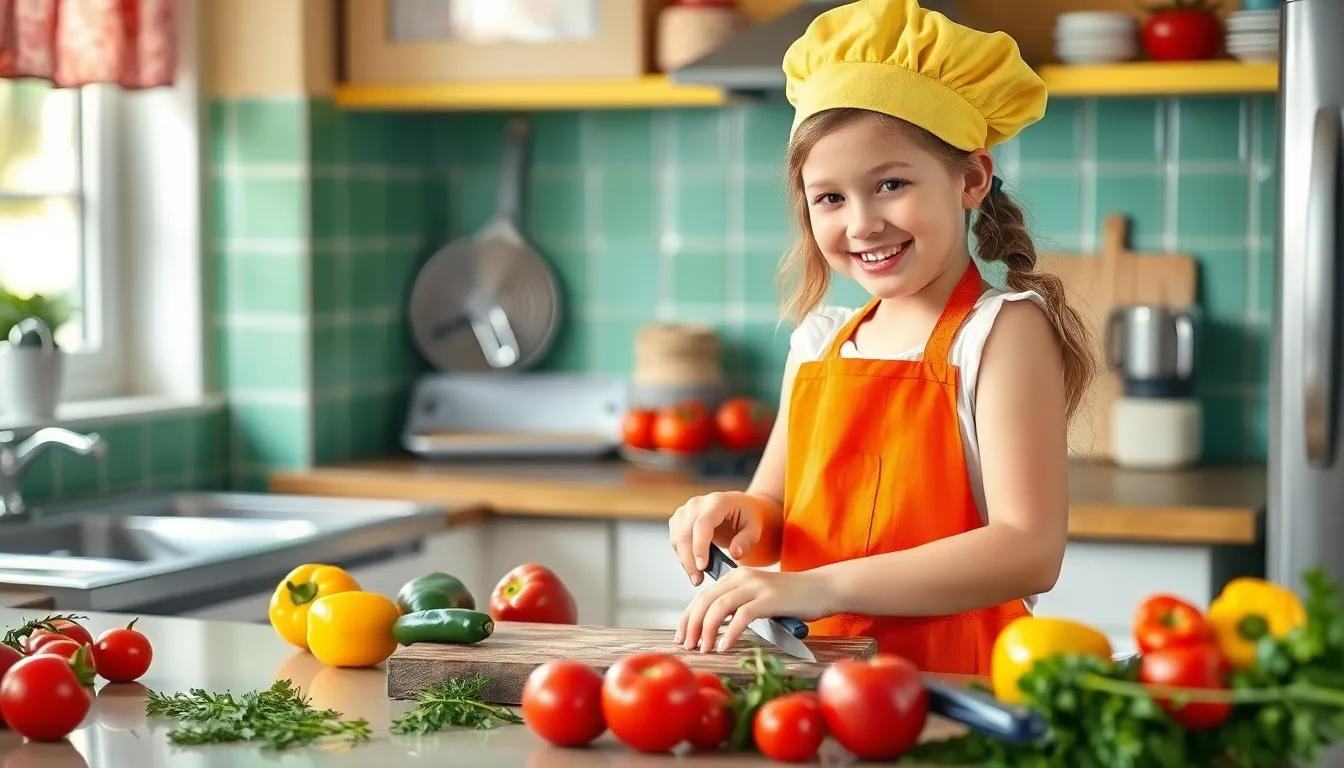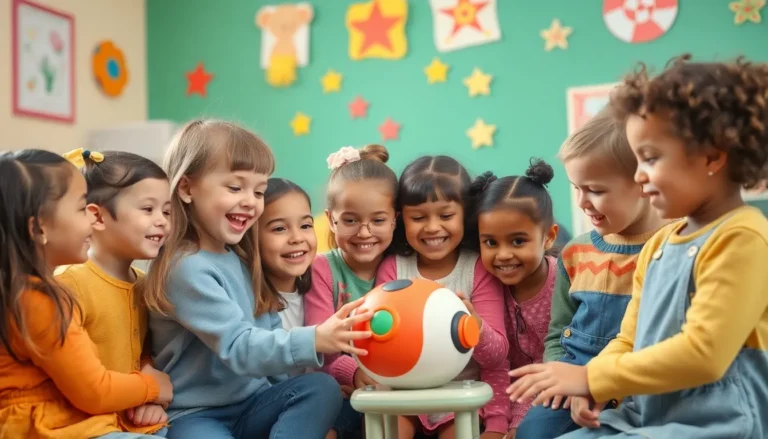Table of Contents
ToggleImagine a kitchen filled with laughter, flour flying, and the delightful aroma of culinary creativity. Cooking with kids isn’t just about making meals; it’s an adventure that sparks imagination and builds confidence. When children dive into the world of creative cooking, they transform into little chefs, crafting dishes that are as fun to make as they are to eat.
What Is Creative Cooking For Kids?
Creative cooking for kids involves engaging children in the kitchen to explore food preparation in a fun and imaginative way. This activity allows them to invent unique recipes and experiment with ingredients. Children embrace the role of chefs, which encourages them to express their ideas while developing culinary skills.
Engagement in creative cooking boosts children’s confidence. They learn to make choices about flavors, textures, and presentation. Creating meals together fosters teamwork as children collaborate with adults or peers, sharing responsibilities.
Hands-on activities play a crucial role in this process. Tasks may include chopping vegetables, mixing ingredients, or decorating dishes. Each step provides an opportunity for learning, encouraging a sense of accomplishment once they complete a dish.
Safety remains a priority in the kitchen. Using age-appropriate tools and supervising activities ensures children cook confidently while minimizing risks. Clear instructions often guide children as they navigate various cooking techniques.
Ultimately, creative cooking for kids serves as a platform for education and exploration. Children acquire knowledge about nutrition, food safety, and cultural cuisines. By introducing diverse foods, they expand their palates, making healthy eating an enjoyable experience.
Benefits Of Creative Cooking

Engaging in creative cooking offers numerous benefits for children, fostering their development in various ways.
Enhancing Culinary Skills
Children learn essential culinary skills through hands-on experiences. They master basic techniques such as chopping, measuring, and mixing, enhancing their ability to prepare meals independently. Experiments with different ingredients build confidence in their cooking decisions. Taste tests promote understanding of flavors, while evaluating textures helps refine their preferences. Working with adults or peers allows them to observe various cooking styles and methods. Cooking encourages patience, as they learn to wait for food to cook properly. Overall, mastery of these skills prepares children for future independence in the kitchen.
Encouraging Creativity
Creative cooking serves as an excellent outlet for children’s imagination. Unique recipe creations promote innovative thinking and problem-solving, allowing them to express their culinary ideas. Exploring colors, shapes, and flavors enables them to develop a distinctive cooking style. Decorating dishes becomes an art, fostering a sense of pride in their creations. Children can combine various cultural cuisines, broadening their understanding of global food traditions. These activities encourage experimentation, welcoming mistakes as part of the learning process. Ultimately, creative cooking nurtures their individual personalities and artistic expression through food.
Fun Cooking Activities
Engaging children in fun cooking activities enhances their culinary journey and sparks creativity. Various activities encourage exploration and foster a joyful cooking environment.
Themed Cooking Days
Themed cooking days offer exciting opportunities for kids to explore various cuisines. Each theme can introduce different cultures, like Italian or Mexican, allowing children to create dishes unique to that cuisine. For instance, on “Pasta Day,” kids can learn to make homemade pasta and sauces, enhancing their understanding of textures and flavors. “Taco Tuesday” invites them to assemble tacos with a variety of toppings, encouraging creativity in presentation and taste. These experiences not only expand their culinary horizons but also promote teamwork and communication as kids work together to prepare meals.
Kitchen Science Experiments
Kitchen science experiments combine culinary skills with scientific exploration, making cooking a learning experience. Simple experiments, like baking soda and vinegar reactions in cupcakes, demonstrate how ingredients interact. Kids can observe the rise of dough through yeast fermentation, showcasing the science behind baking. Another hands-on activity involves creating homemade ice cream, illustrating the states of matter through the freezing process. These experiments empower children to ask questions and seek answers while having fun in the kitchen, solidifying their understanding of both cooking and science.
Recipes For Creative Cooking
Cooking with kids opens a world of possibilities. Here are some recipe ideas tailored to different skill levels.
Simple Recipes For Beginners
Fruits and veggies make excellent choices for beginner recipes. Kids love creating fruit skewers with colorful pieces of watermelon, grapes, and strawberries. Another easy option involves making personal pizzas using English muffins topped with tomato sauce, cheese, and favorite toppings like pepperoni or bell peppers. Building yogurt parfaits is another fun activity, combining layers of yogurt, granola, and berries. Simple recipes encourage kids to explore flavors while developing essential skills.
Advanced Recipes For Young Chefs
Young chefs can take their culinary skills up a notch with more complex recipes. Try making homemade pasta, which involves mixing flour and eggs to create the dough. Rolling and cutting the pasta into various shapes offers hands-on practice. Another advanced idea is crafting sushi rolls, using sushi rice, nori, and an array of fillings like cucumber, avocado, and cooked shrimp. Baking bread introduces kids to the science of yeast and fermentation, making for a rewarding experience. These recipes challenge kids to apply what they’ve learned while honing their creativity in the kitchen.
Tips For Encouraging Kids In The Kitchen
Engaging children in cooking requires a few crucial tips. Prioritizing safety and making the process enjoyable sets the foundation for a positive experience.
Safety First
Safety plays a vital role when kids enter the kitchen. Supervision ensures children use tools appropriately, so adult guidance is essential. Age-appropriate gadgets, such as kid-friendly knives and measuring cups, promote confidence without compromising safety. Clear instructions for using equipment prevent accidents. Establishing kitchen rules, like washing hands and keeping surfaces clean, reinforces safe practices. Demonstrating how to handle foods safely empowers children to make informed choices as they cook. Encouraging them to ask questions about safety fosters an open dialogue and deepens their understanding of kitchen protocols.
Making Cooking Fun
Making cooking enjoyable sparks creativity in kids. Introduce themed cooking days to captivate their imagination, such as a “Pizza Party” or “Taco Tuesday.” Incorporating playful challenges, like decorating cupcakes or creating colorful fruit arrangements, enhances engagement. Setting up a friendly cooking competition with peers stimulates collaboration and camaraderie. Utilizing music or fun kitchen tools can transform cooking into an exciting activity. Offering choices in recipes allows kids to express their preferences, nurturing their independence. Celebrating completed dishes encourages a sense of achievement, reinforcing their motivation to continue exploring culinary adventures.
Creative cooking offers children a unique opportunity to explore their culinary talents while having fun. By engaging in this hands-on activity, kids not only develop essential cooking skills but also boost their confidence and creativity. The kitchen becomes a space for experimentation where they can express themselves through food.
With the variety of recipes and fun activities available, every child can find joy in cooking. The lessons learned extend beyond the kitchen, fostering teamwork and a deeper understanding of nutrition and cultural diversity. As they embark on their culinary adventures, children are likely to build lasting memories and a lifelong love for cooking.








